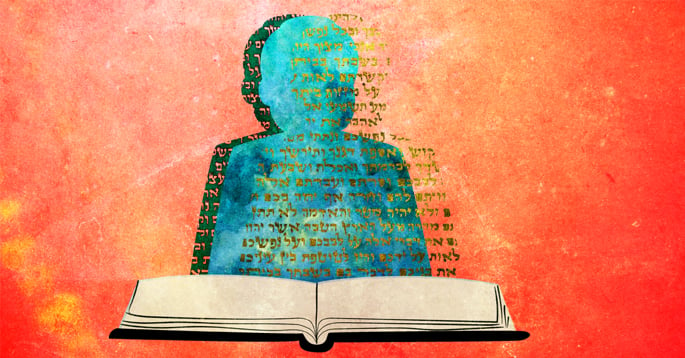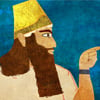Terah (also spelled Terach) was the father of Abraham, the first Patriarch of the Jewish nation. Although Terah worshipped idols and raised his family in the idolatrous city of Haran, his son Abraham independently recognized the existence of one true G‑d, and eventually left his father’s home for the Land of Israel.
Terah: Biography in Brief
Scripture provides few details of Terah’s life.1 He was born in the year 1878 from Creation (1883 BCE) to his father Nahor, who was eighth in line from Noah. Terah married a woman named Amathlai, daughter of Karnebo.2 When he was seventy, his wife bore him a son named Abraham (then called Abram). Abraham was followed by two more sons, Nahor3 and Haran.4
Initially Terah lived in the Chaldean city of Ur Kasdim, but at one point he decided to journey to the Land of Canaan (better known by its later name, the Land of Israel).5 Accompanying him were Abraham, Abraham’s wife Sarah (then called Sarai), and Haran’s son Lot. (Haran himself had died in Ur Kasdim, and Nahor apparently decided to remain behind.6) Along the way they stopped in the city of Haran,7 where they decided to stay.
According to some traditions, Terah originally lived in Haran and that is where Abraham was born. He then relocated to Ur Kasdim, before ultimately returning to Haran.8
When Terah was 145 years old, Abraham and Sarai continued on to the Land of Canaan at G‑d’s directive. Terah himself died in Haran 60 years later, in the year 2083 from Creation (1678 BCE), at the age of 205.
Terah and Nimrod
Midrashic sources9 provide deeper insight into Terah’s life.
Nimrod, king of Babylon, appointed him Chief General of his armed forces, making Terah the highest official in the land, beloved and respected by all.
On the night of Abraham’s birth, Terah’s friends and servants gathered in his house to celebrate. As they left his home, they looked up to the sky and saw a large star ascend from the east and swallow four stars from the four corners of the sky. They understood this to mean that Terah’s new son would ultimately conquer the land and vanquish his enemies.
When Nimrod heard, he summoned Terah to his palace and commanded he bring his son to be killed, promising vast riches in return. Terah cleverly attempted to sway the king’s mind.
“Let me first relate what else happened last night,” he said. “Someone approached me and offered me a huge sum of money to sell my best horse, which His Majesty gave me as a gift. Would you suggest I agree to the deal?”
“That would be ridiculous,” Nimrod replied. “You are quite wealthy, and nothing can replace the horse I gave you, which is the best in the land!”
“This is precisely what you are asking of me,” Terah argued. “What can money do to replace my own child?”
Furious, Nimrod threatened, “If you do not bring me your child, I will kill your entire family!”
Terah was undeterred. He secretly hid Abraham in a cave together with his mother and wet nurse, and provided them with food on a monthly basis. This is where young Abraham spent the first few years of his life.
Read: Nimrod, the Biblical Hunter
Terah the Idol Worshipper
Scripture recounts that Terah worshipped idols.10 Here, too, the Midrash11 fills in additional details.
Not only did Terah worship idols, but he even operated a business selling deities. Once, Terah needed to leave his store, and he appointed Abraham to sell the idols in his stead. However, Abraham discouraged potential customers from buying the idols, explaining to them the futility of worshipping statues that were only fashioned that very day.
Not satisfied with this, Abraham took an ax and destroyed all but one of his father’s idols. He took the ax and placed it in the hand of the largest idol, the only one that remained intact. When Terah returned and saw what had happened, he accused Abraham. But Abraham explained that the largest idol had broken all the others in a fight over an offering that a woman had brought to the store. Terah exclaimed that such a thing was impossible. He then realized that his son had tricked him into admitting that his idols were powerless.
Terah reported his son to Nimrod, and the king sentenced Abraham to death by burning. Abraham was thrown into a fiery furnace, but miraculously he remained unscathed. Meanwhile, Abraham’s brother Haran was unsure with whom to side, Abraham or Nimrod. He decided that he would join whichever party emerged victorious. When Abraham was saved from the flames, Haran proclaimed that he belonged to Abraham’s camp. He was duly thrown into the furnace and died.
The Midrash recounts that Terah was a stargazer, and he saw in the stars that his son Haran would be burned.12
Read: Abraham’s Early Life
Terah’s Later Years
When Abraham’s son Isaac was weaned, Terah traveled from Haran to the Land of Canaan to celebrate with his son.13
According to one source, in his later years, Terah married an additional wife, Pelilah, who bore him a son named Tzova.14
Although Terah spent many years worshipping idols, he ultimately repented, recognizing the futility of his previous way of life and embracing monotheism.15
Some say that Terah was the first person in history to mint coins.16
The Terah-Abraham Paradox
How Abraham came to be born from a father like Terah is puzzling indeed.17 One might think that traits such as righteousness and virtue are hereditary, and one must be born to devout and pious parents to have them.
Abraham teaches us that this is not necessarily the case. Our souls are literally a part of G‑d, and we thus possess unlimited potential, regardless of any outside factors. For this reason, it is possible for the soul of a lofty individual to be born to uncouth or evil parents.18
Moreover, Kabbalah teaches that the lower an entity falls, the higher its source. (An analogy is given from a wall that collapses. The higher the stone on the wall, the further it will land from its original position.) Thus, the fact that Abraham was born to such lowly parents indicates his tremendous greatness.19
Read: What Is a Soul?











Join the Discussion